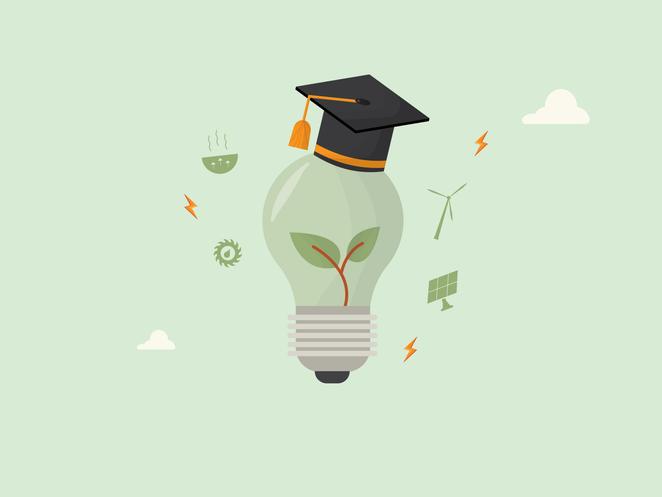
How to embed sustainability in your business school
You may also like
It seems only a short while ago that sustainability was a nice-to-have feature on many business schools’ agendas. Recycling bins, guest lectures and mission statements all contributed towards low-level greenwashing.
Today, views on sustainability have shifted significantly. It’s now a distinct advantage in shaping how campuses function, and what gets taught in the classroom.
Institutions taking sustainability seriously are now climbing university rankings, attracting top talent and preparing students for the complex challenges facing industry.
- Empower students as co-creators in sustainability education
- Competence matters more than content in sustainability education
- Business schools should go beyond the classroom for social impact
The most significant change has been that the expectations of society, government, students, employers and accrediting bodies have moved beyond accepting symbolic gestures on sustainability.
Instead they want to see business schools actually model and teach sustainable practice across a range of disciplines, while also implementing and researching it thoroughly.
Sustainability is a competitive advantage
It’s difficult for business schools to stand out in a packed higher education market. However, sustainability offers a clear route to achieve this, by showcasing practice in environmental and social responsibility.
Linking planning and operations with the UN’s 17 Sustainable Development Goals (SDGs) is another strong way to illustrate and enact your work. The global reach of the SDGs means they provide a shared language for change.
As part of this, we embed sustainability into formal teaching and co-curricular learning, so that every graduate encounters it through sustainability labs and campus-wide activities, all of which align with the SDGs.
This approach emphasises interdisciplinary delivery, with sustainability content being included across programmes and targets.
Our students also benefit from a service learning programme on environmental conservation and recycling, working with our community partners. This builds leadership, teamwork, communication and reflective practice, tied to real-world impact.
As a liberal arts university, we already practise cross-disciplinary discussion, so finance and accounting may debate climate risk disclosure. Strategy courses can feature stakeholder capitalism, and operations classes might examine supply chain resilience.
In addition, it is important that research agendas are expanded to consider sustainability subjects such as the real-world consequences of environmental policy, sustainable investment and corporate responsibility.
This mix better equips students with the practical tools they need to influence policy and industry as their careers develop.
Accreditation organisations, such as AACSB International, are also contributing to these changes with an emphasis on the importance of ethics, social impact and environmental stewardship as part of their requirements.
Furthermore, we lead an EU-backed initiative designed to strengthen leadership and management capacity across Moroccan higher education, establishing a national centre and satellite hubs.
This positions us as a convener for system-level improvement and responsible management education.
As such, we partner with the United Nations Development Programme, the Policy Centre for the New South and the World Bank to advance responsible management conversations and knowledge-sharing at international level.
Senior leaders from STG Telematics, Polydesign Systems, Cosumar and Morocco World News serve as capstone judges, providing feasibility feedback and market-relevance checks on student solutions. This strengthens the links between classroom ideas and industry needs.
On campus, change opportunities can include the development of smart energy systems, solar panels, low-carbon buildings and sustainable transport. Such initiatives reduce emissions and costs, while also reinforcing students’ day-to-day learning.
Industry partnerships are another crucial part of the process. Bringing employers into the mix by working with local communities, businesses and government, all helps position students and academic teams as leaders in regional change and development.
Wherever sustainably practices are put into place, it is important to be transparent. Such openness can be showcased through public reporting, which clearly illustrates how institutions are committed to measurable and inclusive outcomes.
The value of sustainability
One of the clearest benefits of a sustainability-focused education is employability. Companies need workers who can recognise environmental risks, manage social obligations and innovate ethically.
Graduates from programmes that integrate sustainability bring a fresh perspective to their jobs. They understand how profit, people and the environment are interconnected.
Students can evidence their credentials by taking part in projects that reduce plastic waste, research carbon-neutral delivery systems or design renewable energy solutions.
Just as important are the accompanying soft skills this experience brings. Focusing on sustainability initiatives helps build adaptability and ethical reasoning. Students get to make hard decisions where compromise is a necessity, preparing them for leadership.
Embedding sustainability
If your higher education institution is wondering where to begin on sustainability, keep in mind that whatever action is taken, it needs to be more than just an add-on.
Start with a set of clear objectives. Identify a clear link with the institution’s strategy and put accountability structures in place.
Some schools employ a chief sustainability officer, or establish cross-departmental committees to help drive plans forward. Reporting dashboards and audits can further help track progress and identify any inherent weaknesses.
The following top tips can act as a useful guide:
How to initiate sustainability in your business school
1. Leadership commitment
Achieve buy-in from senior leaders and set clear, measurable sustainability goals. A dedicated lead or team will ensure measurable objectives are tracked and progressed.
2. Establish sustainability as part of the curriculum
Embed sustainability across courses; from planning and finance through to strategy and delivery. Help students understand how environmental and social issues can align with business decisions.
3. Use the campus as a living lab
Reduce operating costs and emissions with energy-efficient buildings, solar panels and sustainable transport. But also double up the value of these initiatives by using them as teaching tools.
4. Connect strategy to the UN’s SDGs
Use the UN’s Sustainable Development Goals as a framework that also aligns with research, teaching and partnerships.
5. Extend stakeholder partnerships
Work with government, businesses and NGOs on sustainability projects wherever possible. Students will gain valuable experience with prospective employers and other experts, as the institution develops its community impacts.
6. Be transparent
Publish sustainability reports to highlight both achievements and challenges. This openness builds trust with students and other stakeholders.
7. Link sustainability with employability
Showcase practical projects and the development of soft skills. Graduates who can balance profit with action will become more attractive prospects to employers.
No easy journey
Taking on and embedding sustainability is not easy. It demands vision, investment, ongoing maintenance and a serious commitment from the top. But it also offers a highly valuable opportunity.
As educators, we are tasked with communicating knowledge and helping shape the leaders of tomorrow so that they can effectively navigate complexity and drive positive change. By fully embracing the challenges of sustainability, business schools can deliver on this mission.
Muhammad Ikram is assistant professor of strategy in the School of Business Administration at Al Akhawayn University in Ifrane, Morocco.
If you’d like advice and insight from academics and university staff delivered direct to your inbox each week, sign up for the Campus newsletter.




